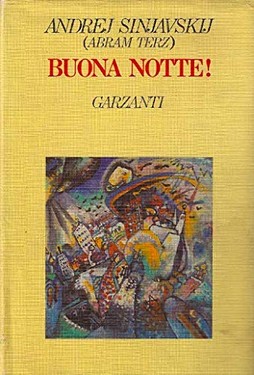Professor and Thug. An Obscure Relationship

Andrej Sinjavskij ovvero l’importanza dello pseudonimo. Che cosa c’è di più normale o, se si vuole, di più banale del falso nome con cui talora uno scrittore firma le proprie opere? Esiste persino un articolo del Codice civile che tutela lo pseudonimo dall’usurpazione da parte di altri. Anche la letteratura russa, naturalmente, ha avuto i suoi pseudonimi illustri: il «padre del realismo socialista», per fare un unico esempio, Maksim Gorkij (Massimo l’Amaro), al secolo si chiamava Aleksej Peškov. Il caso di Sinjavskij, noto con lo pseudonimo di Abram Terz, è però unico nella storia delle finte denominazioni letterarie: non si tratta, infatti, di un innocente nom de plume, ma di un vero destino creativo.
Vediamo, intanto, la cronaca. Nella prima metà degli anni Sessanta i dirigenti dell’Unione degli scrittori sovietici (e quelli del Kgb, organizzazione collegata all’Unione da un rapporto di collaborazione fraterna) erano seriamente preoccupati: a Parigi, con la firma di un misterioso Abram Terz, uscivano articoli e racconti che la terminologia comunista è solita incriminare come «antisovietici». Si trattava di opere scritte in russo che denotavano una sorprendente conoscenza della vita corrente dell’URSS. Pensare che fossero dei falsi compilati da agenti della Cia significava attribuire ai servizi segreti americani troppo geniali capacità. E, d’altra parte, si scervellavano le più belle teste dell’Unione degli scrittori, possibile che qualche vecchio emigrato dei tempi della rivoluzione potesse colpire con così aggiornata e mordace malizia la «patria del socialismo»? Chi era dunque quel misterioso Abram Terz?
Verso la fine del 1965 la legittima curiosità dei corifei del «realismo socialista» fu finalmente soddisfatta: Abram Terz essi, in tutti quegli anni, lo avevano conosciuto e forse frequentato poiché altri non era che il professor Andrej Sinjavskij, docente di letteratura russa all’Università di Mosca e critico letterario del «Novyj mir» (Mondo nuovo), la più vivace e la meno conformista (si era all’epoca della «liberalizzazione») delle riviste sovietiche. Naturalmente, alla scoperta seguì immediatamente l’arresto di Sinjavskij alias Abram Terz e quindi un clamoroso processo che condannò il reprobo a sei anni di campo di lavoro (in Mordovia).
Tralasciamo alcune miserie sulle quali si è fatto di recente un certo rumore: è una notizia a suo modo sensazionale oppure una persino triviale disinformazione la voce secondo cui sarebbe stata la Cia a rivelare al Kgb chi si celava dietro lo pseudonimo di Abram Terz?
Mettere le mani in questa lordura non è gradevole e, soprattutto, è perfettamente inutile. Da evitare è anche un’altra vicenda, sfuggita finora alla vorace stampa occidentale: quella della pubblicazione, su una rivista russa edita in Israele, di una velenosa prosa di Sergej Chmelnitskij, ex amico d’infanzia e di giovinezza di Sinjavskij e a lui legato per comuni vicende che, risentito nel più profondo della non immacolata anima per il ritratto che di lui cifratamente ha fatto lo scrittore in Buona notte!, ha deciso di vuotare il sacco, come si dice, riversandone però il maleolente contenuto addosso a se stesso. Tralasciamo anche questo episodio, con gli strascichi che ha avuto nella battaglia tra le riviste russe dell’emigrazione perché, per quanto patologicamente interessante la «confessione» di un delatore del Kgb, Chmelnitskij, possa essere, essa ci porterebbe lontano dal nostro assunto, che è quello di parlare del testé nominato romanzo di Sinjavskij-Terz Buona notte!, edito da Garzanti nella traduzione di Sergio Rapetti.
Torniamo al punto di partenza, lo pseudonimo, dopo la cronistoria di quell’eccezionale caso di pseudonimia letteraria che qui ci interessa. L’eccezionalità non sta soltanto nella vicenda esteriore sopra riferita, che poi, del resto, tanto esteriore non è, data la sua vissuta drammaticità. Singolare è anche il rapporto semantico-esistenziale, se così si può dire, tra il portatore del nome autentico e il carattere del suo nome inventato: Sinjavskij, professore universitario (lo è anche adesso, nel suo esilio parigino), studioso di non comune valore, non privo di quella patina di accademica posatezza che marchia gli uomini della sua professione; e Terz, uno sfrontato teppista della «mala» odessita, pronto all’azione brutale e all’espressione tagliente.
Se, per riprendere l’esempio del genitore del «realismo socialista», tra Gorkij e Peškov, c’è un’armoniosa identificazione e il popolano autodidatta Peškov si risolve biograficamente nello scrittore proletario Gorkij, tra Terz e Sinjavskij una simile fusione non c’è: il «professore» e il «teppista» sono troppo diversi per diventare tutt’uno. Eppure si può localizzare qui il problema dell’opera letteraria che va sotto il nome di Sinjavskij-Terz (continuiamo ad unire con un facile trattino ciò che, in realtà, è distinto e distante). Buona notte! può essere letto come un ausilio a decifrare questo oscuro rapporto.
Si è parlato di «simbiosi», di una vita in comune di due esseri appartenenti a specie (in questo caso culturali e psicologiche) diverse. Le cose sembrano però più complesse perché, se di simbiosi si trattasse, sarebbe facile individuare i due esseri uniti. Leggendo Buona notte!, in cui Sinjavskij racconta la vita di se stesso che diventa Terz e viene smascherato e condannato, sembra che al di là del duo Sinjavskij-Terz ci sia un’altra entità, più profonda, rispetto alla quale è uno pseudonimo non Terz soltanto, ma anche Sinjavskij. Tra Terz e Sinjavskij si apre una zona d’ombra, un vuoto di luce, un’opacità insondabile da cui promanano entrambi. Si ha il caso di una scrittura, per così dire, senza autore e con due pseudonimi. Nessuno mette in dubbio, s’intende, l’esistenza del professore Andrej Sinjavskij, che felicemente vive con la sua energica consorte in un sobborgo di Parigi, entro una dickensiana palazzina fervida d’operosità (vi ha sede la tipografia della loro casa editrice Sintaksis). Si vuole semplicemente dire che Buona notte! pare scritto da un Altro che non ha nome e che, sotto lo pseudo-pseudonimo Sinjavskij-Terz, svolge il racconto come anonimo io.
Uscito dalla sua tana stregonesca, l’Anonimo, in Buona notte!, gioca con la vita di Sinjavskij alias Terz o di Terz alias Sinjavskij come una palla eterea e variopinta: da estroso giullare fa volteggiare la sfera della «loro» esistenza e, funambolo temerario, la regge sopra un dito, avanzando su una corda tesa tra due nulla. Oppure estrae da una magica cassetta frammenti di biografia di quella sua proiezione che è Sinjavskij-Terz e li combina come in un favoloso caleidoscopio. Non sono grezzi episodi, appena sgrossati dallo scalpello della memoria, come si avrebbe in un comune autoracconto, poiché quest’ultimo presuppone un «sé» che, ricostruendo la propria storia, si srotola in una almeno parziale trasparenza. Sinjavskij-Terz, invece, cerca la sua aggrovigliata identità al di là di ogni episodica e precaria identificazione. Il fantastico, universalmente riconosciuto in lui dalla critica, in Buona notte! non è un artificio letterario: è la manifestazione di una fantasticità metafisica ed esistenziale, avvolta da una surrealtà storica quale è stata la notte di Valpurga dello stalinismo. Il buio che occupa il centro intimo di Sinjavskij-Terz è circondato, al suo esterno, da un altro buio, quello dell’epoca sua, così densa di caligine e di sangue. Tra le due oscurità scocca una miriade di sogni rutilanti, di visioni fantasmagoriche, di incubi diavoleschi, quasi le due zone d’ombra fossero gli opposti poli di una segreta, inquietante affinità d’energia.
Con la voce dell’Anonimo, Sinjavskij-Terz racconta il trasognato arresto, I grotteschi interrogatori, l’assurda prigionia, l’infanzia irreale, gli elusivi sdoppiamenti (prima, ai tempi di Stalin, nel ruolo di collaboratore del perfido Kgb e di salvatore di una sua candida vittima; poi, dopo Stalin, in quello di letterato sovietico a pieno titolo e di dissimulato dissidente ante litteram) in una sorta di paradossale «romanzo di deformazione», dove tutto è obliquo, contorto, scombuiato nelle spire di un barocco morbido e volubile. Andrej Sinjavskij, il professore con una barba da mago e da mugico, dice di aver scritto, con Buona notte!, il suo ultimo romanzo in veste di Abram Terz. Può darsi. Certo è che con felicità d’invenzione ha scritto il suo romanzo primo e, forse, unico, dando fondo a quel tremendo tesoro di esperienza che, come una maledizione portentosa, la notte sovietica gli ha assegnato. Ora che quella notte sembra volgere alla fine, e personalmente per lui è già trapassata in diurna luce, è il caso di augurargli «Buon giorno!», poiché l’anonimo stregone cresciuto in un infernale buio impareggiabile potrebbe non uscire più dalle latebre del suo sottosuolo e spargere sconcertanti e scintillanti sortilegi.
Andrei Sinyavsky or rather the importance of the pseudonym. What could be more normal or, if you will, more banal than the false name by which a writer sometimes signs his works? There is even an article in the Civil Code that protects the pseudonym from usurpation by others. Russian literature, of course, has also had its illustrious pseudonyms: to take just one example, the real name of the «father of the socialist realism» Maksim Gorky (Max the Bitter), was Aleksei Peshkov. However, the case of Sinyavsky, known by the pseudonym Abram Tertz, is unique in the history of false literary names: it is not, in fact, an innocent nom de plume, but a true creative destiny.
Let us first look at the events. In the first half of the 1960s, the leaders of the Soviet Writers’ Union (and those of the KGB, an organization linked to the Union by fraternal cooperation) were seriously concerned: in Paris, under the signature of a mysterious Abram Tertz, were coming out articles and short stories that Communist terminology is wont to incriminate as «anti-Soviet». These works were written in Russian and denoted a surprising knowledge of current life in the USSR. To think that they were forgeries compiled by CIA agents was to attribute too much genius to the American intelligence services. And, on the other hand, the sharpest minds in the Writers’ Union were racking their brains – could an old émigré from the days of the revolution strike with such up-to-date and biting malice at the «homeland of socialism»? Who was that mysterious Abram Tertz?
Toward the end of 1965, the legitimate curiosity of the coryphaei of «socialist realism» was finally satisfied: all those years ago, they had known and perhaps frequented Abram Tertz – he was none other than Andrei Sinyavsky, professor of Russian literature at Moscow University and literary critic of the «Novy Mir» (New World), the liveliest and least conformist (this was in the «liberalization» era) of Soviet journals. Of course, the discovery was immediately followed by the arrest of Sinyavsky alias Abram Tertz and by the clamorous trial that sentenced the reprobate to six years in a labor camp (in Mordovia).
Let’s leave out some misery about which there has been some noise recently: is it sensational news or trivial misinformation that the rumor the CIA revealed to the KGB was about who was behind the alias Abram Tertz?
Delving into this filth is both unpleasant and, above all, perfectly useless. Another affair also has to be avoided, which has so far escaped the voracious Western press: the publication in a Russian magazine published in Israel of a spiteful story by Sergey Khmelnitsky, a former childhood and youth friend of Sinyavsky, linked to him by mutual experiences. Khmelnitsky, resenting in the depths of his not-so-pristine soul the portrait that the writer ciphered of him in Good Night!, decided to spill the beans, as they say, however, discrediting himself. Let us also leave out this episode, with its aftermath in the battle among Russian emigration journals. However pathologically interesting the «confession» of a KGB whistleblower (Khmelnitsky) may be, it would take us far from our purpose – to talk about Sinyavsky-Tertz's aforementioned novel Good Night! , published by Garzanti in Sergio Rapetti's translation.
Let us return to the starting point: the pseudonym, after the account of that exceptional case of literary pseudonymity which concerns us here. The exceptionality does not lie only in the external affair just mentioned – though in truth, it is not so external, given its lived and dramatic nature. Equally singular is the semantic-existential relationship, if one may say so, between the bearer of the real name and the character of his invented one: Sinyavsky, a university professor (still so, even now, in his Parisian exile), a scholar of uncommon worth, not without that patina of academic composure that marks the men of his profession; and Tertz, a brazen thug of the Odessan «underworld», ready for brutal action and sharp words.
To take the example of the parent of «socialist realism», if between Gorky and Peshkov there is a harmonious identification, and the self-taught commoner Peshkov is biographically resolved into the proletarian writer Gorky, between Tertz and Sinyavsky there is no such fusion: the «professor» and the «thug» are too different to become one. Yet one can locate here the problem of the literary work that goes by the name of Sinyavsky-Tertz (we continue to unite with an easy hyphen what, in reality, is distinct and distant). Good Night! can be read as a key to understanding this obscure relationship.
There has been talk of «symbiosis», of two beings belonging to different species living together (in this case, cultural and psychological). However, things seem more complex because if it were symbiosis it would be easy to identify the two beings united. Reading Good Night!, in which Sinyavsky recounts the life of himself who becomes Tertz and gets unmasked and condemned, it seems that beyond the Sinyavsky-Tertz duo there is another, deeper entity, with respect to which not only Tertz is a pseudonym, but also Sinyavsky. Between Tertz and Sinyavsky opens up a zone of shadow, a void of light, an unfathomable opacity from which they both spread out. It occurs a certain writing, so to speak, without an author and with two pseudonyms. No one doubts the existence of Professor Andrei Sinyavsky, who happily lives with his energetic spouse in a suburb of Paris, within a Dickensian mansion fervid with industriousness (the printing house of their publishing house Sintaksis is located there). I simply want to say that Good Night! seems to be written by an Other who has no name and who, under the pseudo-pseudonym Sinyavsky-Tertz, unfolds the tale as an anonymous self.
Emerging from his sorcerous lair, the Anonymous, in Good Night!, plays with the life of Sinyavsky alias Tertz or Tertz alias Sinyavsky like an ethereal, colorful ball: as a whimsical jester he juggles the sphere of «their» existence and, reckless tightrope walker, holds it over a finger, advancing on a rope stretched between two voids. Or from a magical case he extracts the fragments of his Sinyavsky-Tertz projection’s biography and combines them as in a fabulous kaleidoscope. They are not rough episodes barely roughened by the chisel of memory, as it would be in an ordinary self-story, since the latter presupposes a «self» that, reconstructing its own story, unrolls in at least partial transparency. Sinyavsky-Tertz, instead, seeks his tangled identity beyond any episodic and precarious identification. The «fantastic», universally recognized in him by the critics, in Good Night! is not a literary artifice: it is the manifestation of a metaphysical and existential reverie, wrapped in a historical surreality such as the Stalinism's Valpurga Night. The darkness that occupies Sinyavsky-Tertz’s intimate center is surrounded, on its outside, by another darkness, that of his own era, so dense with haze and blood. Between the two darknesses bursts forth a myriad of rutilant dreams, phantasmagorical visions, devilish nightmares, as if the two shadowy zones were the opposite poles of a secret, disturbing affinity of energy.
In the voice of the Anonymous, Sinyavsky-Tertz recounts the dreamy arrest, the grotesque interrogations, the absurd imprisonment, the unreal childhood, the elusive splits (first, in Stalin's time, in the role of collaborator of the perfidious KGB and savior of one of its candid victims; then, after Stalin, in that of a full-fledged Soviet man of letters and a dissimulated dissident ante litteram) in a kind of paradoxical «novel of deformation», where everything is oblique, twisted, turned upside down in the coils of a soft and volatile baroque. Andrei Sinyavsky, the professor with the beard of a wizard and of a muzhik, says he has written, with Good Night!, his last novel as Abram Tertz. That may be so. What is certain is that with felicity of invention he has written his first and, perhaps, only novel, drawing on the tremendous treasure trove of experience that the Soviet night assigned him like a portentous curse. Now that that night seems to be drawing to a close, and personally for him has already passed into diurnal light, it is appropriate to wish him «Good day!». For the anonymous sorcerer who grew up in an incomparable infernal darkness may never again emerge from the gloom of his underground and spread bewildering and scintillating spells.


